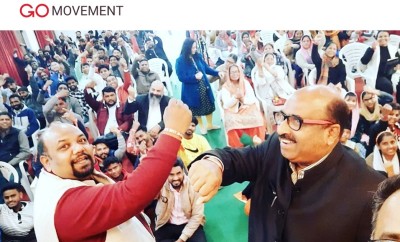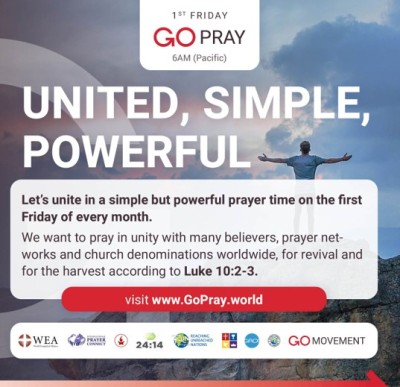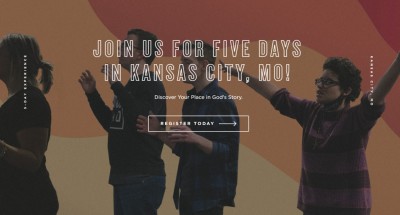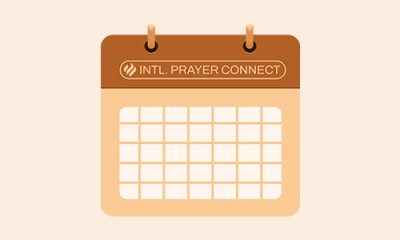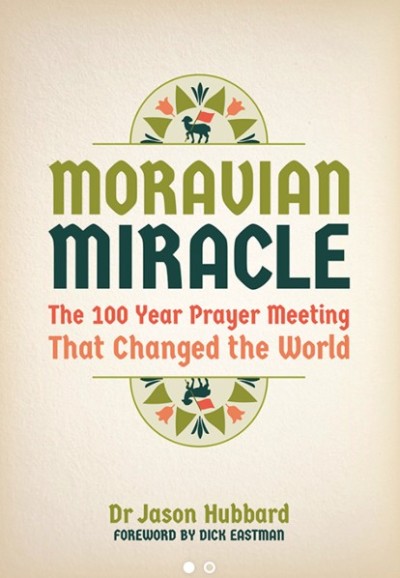Will you join us in Praying for the Buddhist World during the 21-day lead up to Chinese New Year?
We are calling Christians and churches worldwide to take 21 days, January 2- 22, to learn about and pray for our world’s Buddhist friends. With an illustrated and helpful guide, we invite you to pray specifically that Jesus Christ will become known to the one billion people across the globe who are at least nominally Buddhist.
We are encouraging believers to ask the Father to give his Son these Buddhist nations as his inheritance (Psalm 2:8). Let’s ask the Lord of the Harvest to send forth laborers (Matt 9:38) to key Buddhist cities as messengers of Hope, drenched with the Spirit of God, in the power of God for the mission of God!
Browse the Buddhist Prayer Guide
Each day, beginning January 2 – 22, 2023, you will learn something about Buddhist practice and influence in a different place including some specific prayer points for key Buddhist cities in countries with large Buddhist populations like China, Thailand, Japan, Myanmar, Sri Lanka, Vietnam, Cambodia, Korea, and Laos. The last few pages of this guide include key Scriptures to use as we participate in ‘Bible-based’ Prayer!
We want to encourage you to consider adding ‘fasting’ to your times of prayer. We know that the Buddhist peoples of these lands are in need of spiritual breakthrough. The discipline of fasting - abstaining from food for spiritual purposes - is a powerful weapon in spiritual warfare as we cry out for deliverance for our Buddhist friends.
A special focus for this year is the country of China. This guide culminates on January 22 - Chinese New Year. We profile eight of China’s largest cities, and a specific people group within each city to pray for.
Pray…
Let’s pray for the salvation of the peoples of China.
Pray for the Lord to send Chinese believers as missionaries to the remaining unreached peoples.
Pray for unity amongst the churches and leaders of China.
And pray for Chinese families and children to be awakened to Christ for all that He is!
The name Buddha means ‘awakened one.’ Buddhist’s claim to be enlightened with divine revelation. Let’s pray on behalf of our Buddhist friends worldwide to experience a ‘Christ – awakening.’ May they awaken to Jesus Christ for all that He is by the Spirit of the Living God. As the Apostle Paul shared,
“For God, who said, “Let light shine out of darkness,” has shone in our hearts to give the light of the knowledge of the glory of God in the face of Jesus Christ” – 2 Cor. 4:6
The Buddhist World Prayer Guide is available in 20 languages online and 10 as a PDF download and is being distributed through more than 1000 prayer networks worldwide.
We hope you can join us and add your prayers with millions of Jesus followers around the world for a Global Christ-awakening amongst our Buddhist friends.
May we win for the Lamb who was slain the due reward for his sufferings!
Dr. Jason Hubbard – Director
International Prayer Connect
People are More Open to the Gospel During the Holidays!
The photo above is from a church service in India where hundreds of churches worked together to share their faith during the holidays.
The Christmas season is here! And so are opportunities to share your faith. Holiday gatherings, presents, and parties open doors to sharing your faith.
A friend from Chile reported last year: "This Christmas we saw many children coming to Christ, let's not think they don't understand, they are more open today to receive Christ in their lives! "
 What an amazing testimony of reaching children with the true message of Christmas - Christ with us. You can be a part of reaching the nations with the message of salvation during the holidays!
What an amazing testimony of reaching children with the true message of Christmas - Christ with us. You can be a part of reaching the nations with the message of salvation during the holidays!
I want to reach people for Christ during Christmas!
The holiday season is here! Watch GO MOVEMENT's socials for how you can reach our friends and family with the message of salvation!
People are open to the Gospel during this time. We want to provide resources to help you share your faith.
God bless you,
Werner Nachtigal - Founder
GO MOVEMENT
https://www.gomovement.world/
Jesus is the ultimate man of prayer! Like the disciples, we will come and ask the Lord Jesus, “teach us to pray” at this course starting on January 5, 2023! – Led by Dr Jason Hubbard.
During this course we will explore the prayers of Jesus, the parables of Jesus on prayer, the interconnection between prayer and world mission, prayer and spiritual warfare, and the posture and position of prayer witnessed in the Gospels.
You will leave this course with the practical tools to encounter the Triune God of grace in conversation, intimacy, and effective intercession!
More info & Sign Up:
We are excited to continue our GO PRAY 1st Friday, 'Praying for the Harvest' with key prayer ministries from around the world.
We will meet together on January 6th, 6:00am - 7:00am (pacific) to pray together with Teaching and worship, led by Dr Jason Hubbard (IPC).
Then from 7:00am - 8:00am we will pray for the Buddhist World: 24/7 prayer and Breakthrough of the Gospel!
As always, our primary prayer focus is that Jesus Christ will be exalted, honored, and treasured in the nations!
May He be 'revealed' that He might be 'revered.' May He have the Supremacy and Pre-eminence in all things, Col. 1:18 ... He is Worthy!
GO PRAY - 1st FRIDAY – January 6th 2023
6AM (PACIFIC) | 1PM (UTC) | 8PM (WIB)
More info and register to Join us at www.gopray.world
JOIN US FOR FIVE DAYS IN KANSAS CITY, MO!
Discover Your Place in God's Story.
YOUR IMMERSE JOURNEY
During your five days you will experience teaching to enlarge your vision, ministry times to hear the Lord’s voice and encounter Him, worship in the Global Prayer Room (where prayer with worship have gone on for the past 22+ years), and so much more.
Be equipped with practical ministry opportunities, prayer and worship labs, hands-on experience, and tools that will give you confidence as you take your place in the story that will make Jesus famous to all the ends of the earth.
Each day of Immerse is packed full, from morning through evening. A more detailed schedule will be provided upon arrival.
 Daily Schedule - What You Can Expect
Daily Schedule - What You Can Expect
Morning Coffee Connects
Morning & Afternoon Sessions
Breaks for Lunch and Dinner
Time in the Global Prayer Room
Harp & Bowl Lab
Evening Events
Core Teaching - What You Will Learn
Intimacy With God
The Global Prayer Movement
The Lifestyle of a Forerunner
The Israel Mandate
God’s Global End-Time Plan
More info and Sign Up: https://ihopu.org/immerse
110 Cities Prayer
www.110cities.com
21 Days Buddhist World Prayer – Prayer Guide
110cities.com/buddhistprayerguide/
Global Family 24-7 Prayer Room
https://www.globalfamily24-7prayer.org/
Prayer Covenant for Children Mobile App
theprayercovenant.org/mobileapp/
WPA 2.0 Replays
www.worldprayerassembly.org
Last Quarter Evangelism - Oct 1 to Dec 31
theprayercovenant.org/
Revive Europe – 28 Dec – 2 Jan
https://reviveeurope.org/en/
New Years Day Prayer Relay – Jan 1st 2023 www.sunriseprayerrelay.com
Jesus and Prayer (Free Online Course) Comm Jan 5
www.aqueductproject.org/prayer-certificate
1st Friday - GO PRAY – Jan 6th 2023
www.gopray.world
IHOPKC Immerse Jan 23-27
www.ihopu.org/immerse/
Africa Regional Prayer Conference
Jan 31st – Feb 4th
www.ipcprayer.org
The Moravians changed the world
By God’s grace, we will too.
The prayers of humble believers change the course of history. A band of ragtag worshippers discovered this truth in 18th-century rural Germany, launching a 100-year prayer meeting that birthed the modern missionary movement. Often overlooked, the story of the Moravians comes to life in this incisive, devotional account. Moravian Miracle will fix your gaze on the glorious, conquering Lamb who is now gathering his church for one final prayer-saturated harvest of souls.
Moravian Miracle is written by Dr Jason Hubbard - Director of International Prayer Connect.
WHAT OTHERS ARE SAYING:
“Fascinating and deeply motivating.”
- Rick Warren, The Purpose Driven Life
“A true gift to the global body of Christ.”
- Mike Bickle, International House of Prayer
Watch the intro video
ORDER NOW ON AMAZON!
Price: US$12 | AU$18 + Postage
See Amazon for local pricing
Non-Amazon Country Orders...
If Moravian Miracle isn’t available to your country from Amazon, Click here to add your info to our list, and we will be in contact with you as soon as Moravian Miracle is available in your nation!
More info, order links, videos and resources at www.moravianmiracle.org
Ian Cole, Senior Advisor to IPC and founder of the World Prayer Centre, Birmingham, UK has put together a daily declaration that we can declare every day for God to release faith, hope and trust over our lives.
A DAILY DECLARATION OF FAITH, HOPE AND TRUST
I DECLARE TODAY: YOU ARE OMNIPOTENT, OMNISCIENT, AND OMNIPRESENT TRIUNE GOD, FATHER, SON AND HOLY SPIRIT.
Father,
Your beauty is my worship
Your Face my delight
Your Son Christ Jesus is my Saviour
Your Spirit is my comfort and guide
Your cross Jesus, is my redemption
Your life Jesus is my life
Your body my food
Your blood is my cleansing
Your word Father, is a lamp to my feet
Your Grace is my cover
Your mercy my freedom
Your righteousness my clothing
Your Joy is my strength.
Your protection my fortress
Your peace is my rest
Your presence my security
Your name my healing
Father, I thank you, that in declaring these truths,
I believe for me today
Your love is unfailing, your goodness never ends, your kindness overwhelms and your faithfulness is everlasting. AMEN
A DAILY DECLARATION OF FAITH, HOPE AND TRUST 2022 © World Prayer Centre. The declaration can be copied and distributed freely acknowledging World Prayer Centre www.worldprayer.org.uk
Ian has also written “A Gift of Hope”. The new e-book contains the Trilogy of Hope articles written by Ian Cole and the Daily Declaration.
May the Gift of Hope bring you joy at Christmas! If you would like to purchase the Gift of Hope e-book, you can purchase and download here.
We hope that you can join us in praying this daily declaration compiled by Ian Cole. Let us declare faith, hope, and truth for us and our families. Download a PDF of the declaration

